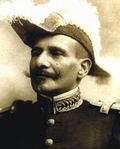The nephew of Deodoro da Fonseca, Hermes Rodrigues da Fonseca, entered military school at the age of 16 and was named lieutenant in 1878. After ten years of service he was made aide-de-camp to his uncle. In 1890 he assumed the command of the 2nd Artillery Regiment. In 1893 he participated in the suppression of the Navy Revolt and was promoted to colonel. He reached the top of his military career in 1906, when he was named marshal. Appointed war minister (15 Nov 1906 - 27 May 1909) in the cabinet of Afonso Pena, Hermes da Fonseca advocated the introduction of obligatory military service (1908). In 1910 Marshal Hermes became one of the founders of the Conservative Republican Party (Partido Republicano Conservador) and won the majority of votes in the presidential election of 1 Mar 1910. His opponent, Rui Barbosa de Oliveira, attempted to contest the election results, but the marshal was certified as winner by the federal electoral committee. The election of Marshal Hermes reflected a lack of agreement between the leaders of two major groups, representing the states of São Paulo and Minas Gerais, respectively, who interchangeably dominated the political scene in a combination known as "coffee-with-milk" politics. The presidency of Marshal Hermes was strongly influenced by the personality of José Gomes Pinheiro Machado, president of the Senate, who had proposed the candidacy of the marshal for president and backed his legislative initiatives in the Congress. When Marshal Hermes and vice president Venceslau Brás assumed their offices in November 1910, political instability continued to plague the country. Soon after his inauguration, Marshal Hermes faced a rebellion in the Navy caused by severe physical punishments applied to the sailors. In 1912 a rebellion of messianic character spread in the territory of future states of Paraná and Santa Catarina. The rebellion, initiated by monk José Maria, was not extinguished until 1916. Mass manifestations rolled through the capital and states when the government applied a new law on expulsion of foreign workers involved in the strikes. On 8 Oct 1913 the Congress sanctioned the introduction of a state of emergency in Rio de Janeiro to control the labor movement. In December 1913 the government had to combat the revolt in Ceará, where the clergy joined forces with the opponents of pro-government governor Marcos Franco Rabelo. On several occasions, the Fonseca administration used federal troops to back the election of pro-government candidates and intervened in the state elections. In November 1914 he passed the presidency to the election winner Venceslau Brás and was chosen to the Senate, but refused to serve and went to Europe. Upon his return to Brazil, Fonseca was elected president of the Military Club (26 Jun 1921), a position he used to muster opposition forces against the government of Epitácio da Silva Pessoa. The club was closed by resolution of state authorities in mid-1922. Marshal Hermes was placed under arrest, while his son emerged as one of the leaders of rebellion in the Fort of Copacabana. The marshal was released in early 1923 and died nine months later. [1] |

